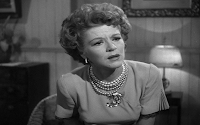...Uma Thurman in Pulp Fiction (1994)
Uma Thurman plays Mia Wallace, the prized, protected wife of a big-time L.A gangster who has left her to be looked out for by one of his top hit men Vincent (John Travolta in a nuanced, perfect performance) while he is out of town on business.
Mia's name/character haunts the film long before she finally makes her appearance, and the build up, from the outset, provides her with a mixed air of mystery and intensity, that slightly shakes an unprepared Vincent.
Mia brings them to have dinner at Jack Rabbit Slim's, an eye-popping, expansive, nostalgic burger joint, that also offers steaks and Five Dollar Shakes. Though their arrangement isn't technically "a date", Thurman's Mia begins to casually establish the encounter -- for herself at least -- as something more than an arrangement made for her by her husband. And Thurman's performance establishes this savvy from the get-go.
Their extended conversation quickly begins to cover their present lives, pasts, careers, and subtle philosophies on the world they inhabit. And with each topic Thurman's Mia takes advantage of the chance to scope out Vincent and see what kind of connection the two could possibly share, beyond the banalities of the everyday (criminal) life they both revolve around. Thurman imbues a kind of playfulness to the sequence, and let's us see that Mia enjoys the pleasure of being always one step ahead of the curious, but oblivious Vincent, despite the fact that she genuinely enjoys his company.

As the conversation gets more and more into intimate territory, Thurman's Mia becomes more lucid and lively than ever before -- and though even with the aid of Tarantino's crackling dialogue -- Thurman is able to still keep Mia enigmatic. Thurman was simply born to speak QT's words (watch the joy of the Kill Bill's for an extension of mastery on both the part of the actress and director), and here she handles the wordplay with a vivid immediacy, that lead to some excellent line readings.
With all that, the role seems simple enough for Thurman. The actress' gifts of a distinctive screen presence and uncommon charisma -- both of which keep Mia in a sharp, magnetic focus -- are perfectly suited for this strange role, but Uma goes farther past that.
Her accomplishment in the role comes from her understanding that, while QT's words have a juicy surface, the complexity of them exists underneath and in-between them. That the entertaining and brisk banter holds more weight than what we might hear. With this, Thurman is able to subtly illuminate the compelling shades of Mia's interior life -- her sense of humor, curiosity, loneliness, kindness, etc. -- while also ably conveying the fact while Mia is a woman inclined to making bad choices, she has an edge of intelligence and knows what she wants.
And in addition, she currently wants to win the restaurant's Twist Contest trophy. And with that the two get up and shake their groove things in hope of winning.
Back at home, with Vincent of two minds in the bathroom, an ecstatic Mia dances about the house in bliss, until she settles down on the couch and discovers a bag of Vincent's recently purchased heroin (which she believes to be coke).
 Helping herself to a long line, Mia quickly begins to suffer the effect of an overdoze, and in a flash her eyes, once bright and gleaming, now only see death.
Helping herself to a long line, Mia quickly begins to suffer the effect of an overdoze, and in a flash her eyes, once bright and gleaming, now only see death.Once discovering Mia's condition, Travolta's Vincent in a state of incredibly high anxiety, zooms over the home of his drug dealer Lance (Eric Stoltz) with Mia in quick need of help to revive her.
 Which he does. With a long needle being plunged into her heart, which instantly awakens Mia who flings around, panicked and disoriented.
Which he does. With a long needle being plunged into her heart, which instantly awakens Mia who flings around, panicked and disoriented.
This exhilarating sequence is topped off with an offhand, "Something.." (when Mia is asked to say something if she's alright), and Rosanna Arquette's -- "That was fuckin' trippy!" -- perhaps the best tension reliever.
This leads to Mia's final scene (we only briefly see her again) as she returns home shaken and uneasy after one helluva night. She and Vincent solidify their kind of special "bond" through two final beats. Both agree to keep this messy incident a secret from Marsellus, and shake on it. And Mia finally lets Vincent in on what her corny, unfunny joke was, as if softly giving him something in return.
Thurman delicately handles this scene with a haunting, tender sadness; her complexity revealing itself in a whole new way. For her, the past couple of hours have been new to her experience of self, as she has seen and felt things unlike anything before.
Uma Thurman's work in Pulp Fiction is even greater than what an already juicy, memorable part imagined. In a role that many other actress' might have overplayed into a neurotic mess of contradictions, Thurman's performance grounds in a simple, charismatic humanity. For an actress and film I love, I'll say this -- Uma Thurman's performance is a perfect addition to a perfect film.






























